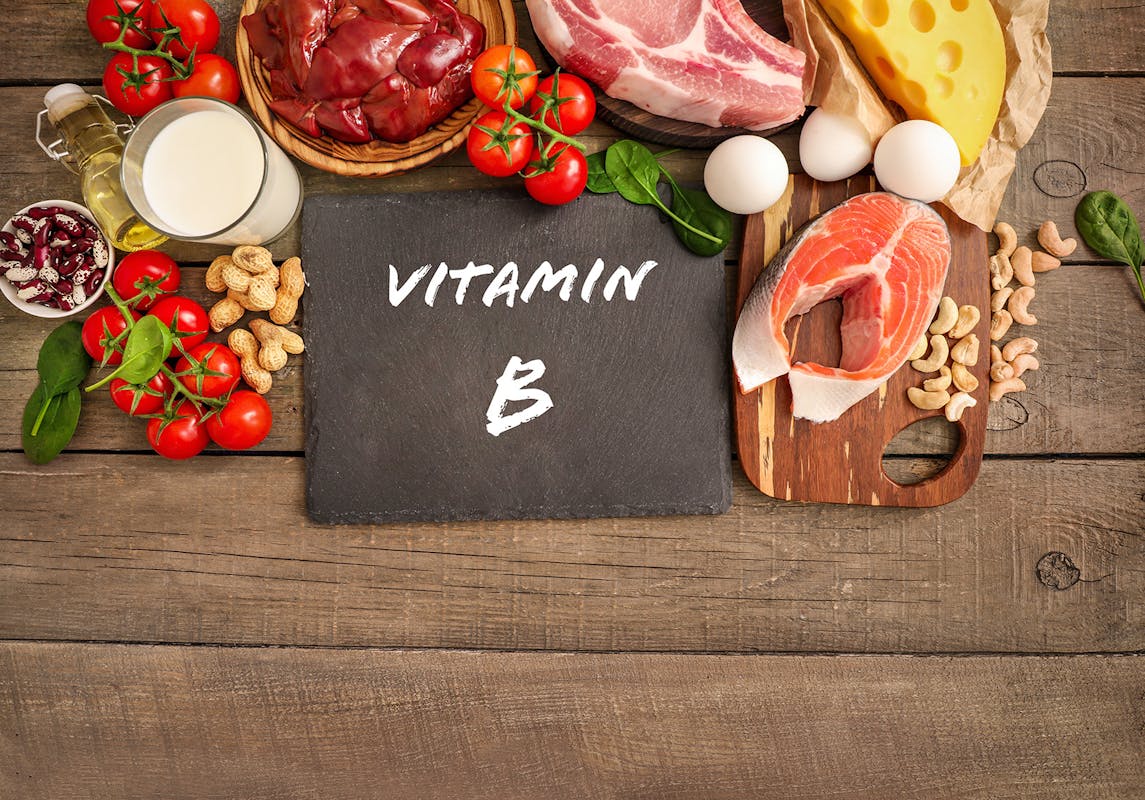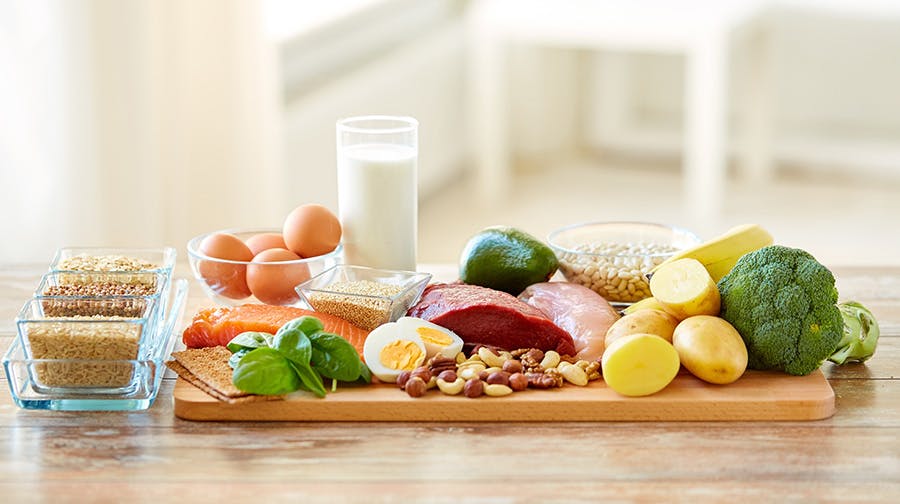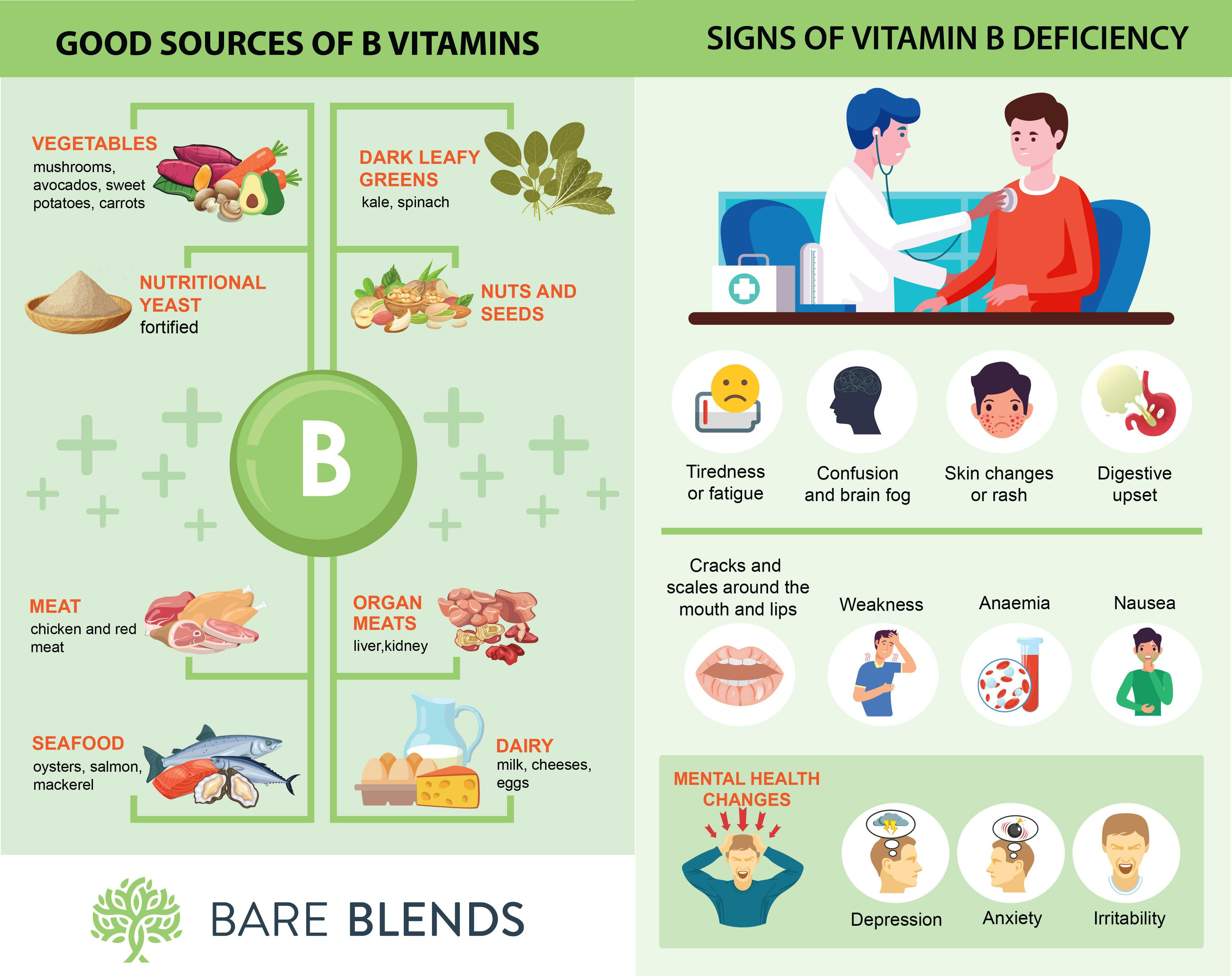A Guide To B Vitamins: Everything You Need To Know
Vitamin B is essential for a vast range of bodily functions.

Bare Blends
2021-02-05

B Vitamins - why so essential?
Vitamin B deficiency is one of the most common ailments in Australia. In the last few years we have seen a steady rise in the number of vegetarian and vegan diets, and as more Australians reduce their animal product intake, health professionals have advised to minitor B vitamin levels, bringing this topic to the forefront.
What is Vitamin B?
B vitamins are a collection of eight water soluble nutrients that together form B-complex. They occur naturally in food and most cannot be stored in the body, so it's important to consume adequate B vitamins through a healthy balanced diet or supplementation.
B vitamins are essential for a vast range of bodily and organ functions, particularly brain function, and each different one has a unique role in the body, though they depend on each other for adequate absorption and optimal health benefits.
Why should you consider supplementing Vitamin B?
Evidence suggests that large sub populations are not consuming adequate amounts of B vitamins through their diet; mainly those who limit consumption of animal products without adequate monitoring of incoming nutrients.
What is Vitamin B deficiency?
It's important not to self diagnose as symptoms of B vitamin deficiency can vary depending on which one you are lacking, working with a health professional can provide clarity. In general vitamin B deficiency symptoms can look like:
- Tiredness or fatigue
- Confusion
- Trouble concentrating
- Weakness
- Skin changes or rash
- Anaemia

Types of B vitamins
Vitamin B1 - Thiamin
Thiamin has an essential role in carbohydrate metabolism - it aids in converting glucose into energy and plays a role in nerve health, helping our neurons function adequately.
Thiamin is mainly found in cereal foods and in Australia there is a mandatory enrichment of baking flour (but not in NZ).
Good sources of Thiamin:
- Wholegrains
- Fortified cereals and flour
- Pork
- Fish, mussels
Vitamin B2 - Riboflavin
Riboflavin in its active form creates two coenzymes in the body: flavin mononucleotide and flavin adenine. These co enzymes have major roles in energy production, growth, cell function and fat metabolism.
Riboflavin and its derivatives are essential for the way the body handles some nutrients, for example the conversion of tryptophan to niacin(B3) and activating vitamin b6.
Good sources of Riboflavin:
- Dairy: milk, yoghurt, cheese
- Eggs
- Organ meats: kidney and liver
- Wholegrains
- Green leafy vegetables
Vitamin B3 - Niacin
Over 400 enzymes in the body require active niacin to perform their functions. The active form of Niacin is called nicotinamide adenine dinucleotide (NAD) and all tissue in the body can activate niacin.
NAD is required for energy production (ATP production) and is also required for integrity of our genes and cellular communication. Niacin also aids in skin health and supports the nervous and digestive systems.
Good sources of Niacin:
- Beef
- Pork
- Wholegrains
- Eggs
- Milk
Vitamin B5 - Pantothenic Acid
Pantothenic acid is required in our bodies to create new coenzymes, protein and fats. The main one to note is synthesis of coenzyme A which is essential for fatty acid synthesis giving our bodies the ability to use fats for a multitude of anabolic and catabolic processes.
Pantothenic acid is also involved in producing red blood cells and hormones.
Good sources of Pantothenic Acid:
- Meat: chicken and beef particularly liver and kidney
- Potatoes
- Tomatoes
- Cereals
- Egg yolks
Vitamin B6 - Pyridoxine
Vitamin B6, Pyridoxine, is required for over 100 reactions in the body, particularly turning our food into energy (ATP).
Pyridoxine is key in the metabolism of our amino acids and glycogen and also plays an important role in cognitive development and supporting immune function.
Good sources of Pyridoxine:
- Meats: fish, chicken and organ cuts
- Legumes: chickpeas
- Potatoes
- Fortified cereals

Vitamin B7 - Biotin
Biotin has been shown as vital in assisting the breakdown of all food groups, cellular function, energy metabolism and the regulation and integrity of our DNA.
Good sources of Biotin:
- Meats: fish, chicken, beef and organ cuts
- Eggs
- Sunflower seeds
- Yeast
Vitamin B9 - Folate
Folate is the natural form of B9, folic acid is the synthetic version used widely in supplements and fortifying foods. B9 is particularly needed during periods of growth for production of red blood cells and is essential for creating DNA and RNA, it also reduces the risk of birth defects during pregnancy.
Good sources of Folate:
- Whole grains
- Seafood
- Dark leafy greens: spinach, brussel sprouts, broccoli, asparagus
- Beans and peas
- Peanuts
- Sunflower seeds
- Citrus fruits
Vitamin B12 - Cyanocobalamin
Cyanocobalamin is critical in regulating the nervous system and for neurological function. It's essential for maintaining the myelin sheath around our nerves. Cyanocobalamin is also needed in the body for red blood cell formation and proper blood function.
Good sources of Cyanocobalamin:
- Meats: fish, poultry, beef
- Dairy: cheese and milk
- Fortified cereals
- Nutritional yeast
- Eggs
Best natural source of Vitamin B?
Research has proven that vitamins of a natural source are better absorbed and used by the body when compared to synthetic man made sources and naturally occurring B vitamins have shown to have a stronger effect than their synthetic counterparts.
Quinoa-B
At Bare Blends we pride ourselves on the ability to maintain optimal health through natural sources. One dose of Quinoa-B complex provides 100% of an individual's RDI for B vitamins from naturally occurring B vitamins found in quinoa. It's vegan friendly, gluten free and won't leave any synthetic residue in the body.
Bare Blends Quinoa-B complex:
- Is derived from quinoa sprouts
- Contains plant phyto substances, making them active and bioavailable
- Is a vitamin B complex which contains all eight B vitamins
- Completely organic
- Gluten free
Sources:
B Vitamins and the Brain: Mechanisms, Dose and Efficacy—A ReviewVitamin and mineral supplements
Thiamin
Thiamin – Vitamin B1
Riboflavin
Riboflavin
Niacin
Niacin
Vitamin B
Pantothenic Acid
Vitamin B5 (Pantothenic Acid)
Pantothenic acid
Vitamin B6
Vitamin B6
Vitamin B6
Biotin
Biotin
Biotin – Vitamin B7
Vitamin B9
Folate (Folic Acid) – Vitamin B9
Folate
Folate
Vitamin B12
Vitamin B12
Vitamin B12
